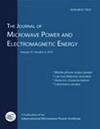使用2.45 GHz固态发生器的自匹配等离子体源:微波设计和工作性能
IF 0.9
4区 工程技术
Q4 ENGINEERING, CHEMICAL
Journal of Microwave Power and Electromagnetic Energy
Pub Date : 2017-10-02
DOI:10.1080/08327823.2017.1388338
引用次数: 14
摘要
结合最近发表的研究结果,设计了两个2.45 GHz微波等离子体源:工作在0.01 ~ 10 Pa之间的同轴电子回旋共振型源和工作在1 ~ 100 Pa更高压力范围的碰撞型源。主要目标是建立自匹配等离子体源,它可以在没有任何阻抗匹配组件的情况下保持低反射功率水平。微波场由功率在0 ~ 200w、频率在2.4 ~ 2.5 GHz之间可调的固态微波发生器同轴馈电提供给各等离子体源。发电机的可调频率用于当反射功率增加到设定值以上时作为备用匹配手段;自动调节回路使微波发生器开始扫描频段,直到找到最低的反射功率电平。介绍了获得自适应等离子体源的建模方法;通过测量等离子体内部传输的微波功率效率与气体压力、气体类型和微波正向功率水平的关系来评估每个源的性能。介绍了等离子体源在4英寸硅片上沉积纳米晶金刚石和不锈钢渗氮等工业应用中的测试结果。本文章由计算机程序翻译,如有差异,请以英文原文为准。
Self-matching plasma sources using 2.45 GHz solid-state generators: microwave design and operating performance
ABSTRACT In connection with recently published results, two 2.45 GHz microwave plasma sources were designed: a coaxial electron cyclotron resonance-type operating between 0.01 and 10 Pa and a collisional-type for higher pressure range, 1–100 Pa. The primary goal was to build self-matched plasma sources, which can maintain low reflected power levels without any impedance matching component. The microwave field was supplied to each plasma source via a coaxial feed from a solid-state microwave generator with adjustable power between 0 and 200 W and adjustable frequency from 2.4 to 2.5 GHz. The adjustable frequency of the generator is intended to be used as backup matching means if the reflected power increases above a set value; an automatic adjustment loop enables the microwave generator to start sweeping the frequency band until the lowest reflected power level is found. The modelling method used to obtain self-adapted plasma sources is explained; the performance of each source is evaluated by measuring the efficiency of the microwave power transmitted inside the plasma vs. gas pressure, gas type and microwave forward power level. Results of plasma source testing in industrial applications such as nanocrystalline diamond deposition on 4 inch silicon wafers and stainless steel nitriding are presented.
求助全文
通过发布文献求助,成功后即可免费获取论文全文。
去求助
来源期刊

Journal of Microwave Power and Electromagnetic Energy
ENGINEERING, CHEMICAL-ENGINEERING, ELECTRICAL & ELECTRONIC
CiteScore
2.50
自引率
6.70%
发文量
21
期刊介绍:
The Journal of the Microwave Power Energy (JMPEE) is a quarterly publication of the International Microwave Power Institute (IMPI), aimed to be one of the primary sources of the most reliable information in the arts and sciences of microwave and RF technology. JMPEE provides space to engineers and researchers for presenting papers about non-communication applications of microwave and RF, mostly industrial, scientific, medical and instrumentation. Topics include, but are not limited to: applications in materials science and nanotechnology, characterization of biological tissues, food industry applications, green chemistry, health and therapeutic applications, microwave chemistry, microwave processing of materials, soil remediation, and waste processing.
 求助内容:
求助内容: 应助结果提醒方式:
应助结果提醒方式:


